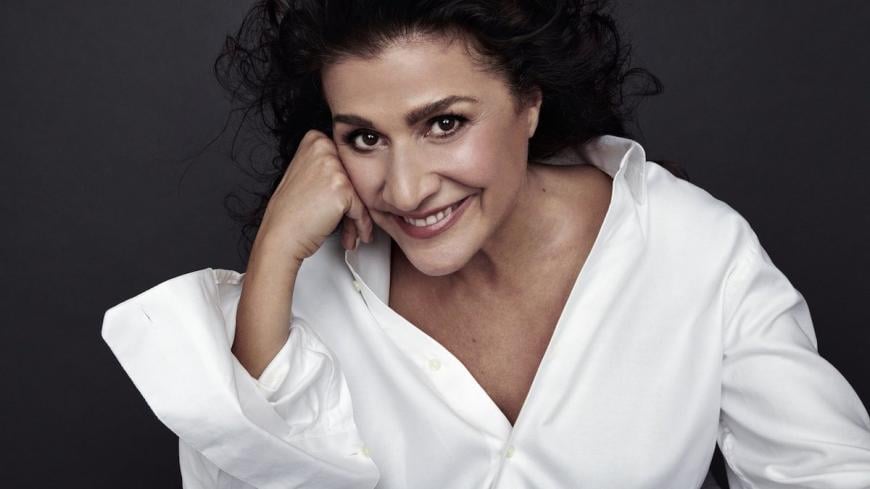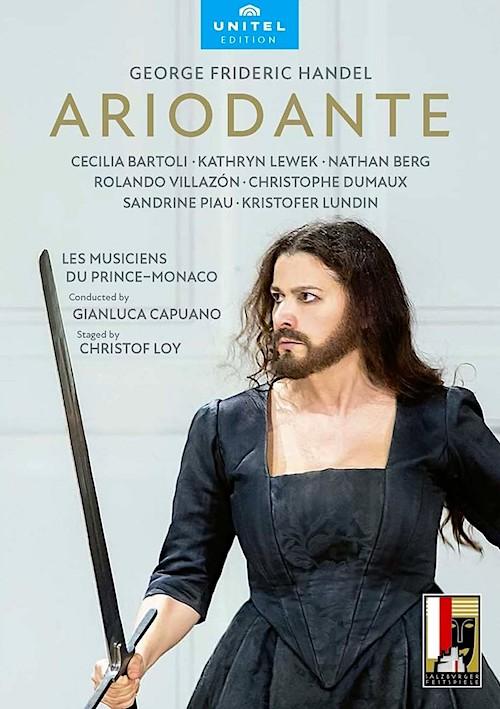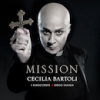
The singing in the video production of Handel’s Ariodante, filmed live in the Haus für Mozart at the Salzburger Festspiele in 2017, is sensational. The production, however, which begins with a bearded Cecilia Bartoli, as Ariodante, who eventually shucks the beard, dresses as a woman, and reveals that they’ve embraced their true female self, is problematic. The only thing more incredible than that little trans update to an opera that premiered in 1735 with a countertenor playing the male warrior Ariodante is that not a single character blinks an eye at Ariodante’s transition, not even their future wife.
Ariodante centers on the love between valiant Prince Ariodante (mezzo-soprano Cecilia Bartoli) and the lovely Ginevra (soprano Kathryn Lewek), daughter of the King of Scotland (bass Nathan Berg). Into the King’s castle in Edinburgh saunters the wicked Polinesso (countertenor Christophe Dumaux), Duke of Albany, who is determined to make Ginevra his own and thus inherit the kingdom. We also encounter Ginevra’s lady-in-waiting, Dalinda (soprano Sandrine Piau), who is so hopelessly smitten with Polinesso that she ignores his cruelty and deceit; Ariodante’s brother, Lurcanio (baritenor Rolando Villazón), who is hopelessly smitten with Dalinda; and a gentleman of the court, Odoardo (tenor Kristofer Lundin), who often seems superfluous. Polinesso’s vile plots almost succeed, but Ariodante saves the day and Ginevra’s honor, Lurcanio kills Polinesso in a duel, and then marries Dalinda in a double wedding with Ariodante and Ginevra.

Librettos are more than plot and Ariodante, adapted from a libretto by Antonio Salvi, whose source was Ludovico Ariosto’s epic poem Orlando furioso, is full of feeling, which Handel took advantage of in some of the most emotionally powerful — and breathtakingly virtuosic — music he ever created.
Kathryn Lewek’s voice is unfailingly lovely and absolutely secure on top. She moves with grace and charm, and expresses joy with all the vivaciousness, if not unbridled excitement, of Cecilia Bartoli. They’re an ideal vocal pairing. Lewek also knows how to touch the heart. She’s a major find.
Sandrine Piau’s Dalinda proves almost as beguiling as Lewek’s Ginevra. As reliable as ever, Piau is capable of suddenly plucking a glorious high B or the like out of the blue. Only twice does the challenge of emoting strongly while flawlessly negotiating rapid runs produce a harsh high note. She is not the most convincing at playing someone who can’t put two and two together — she’s far too knowing an artist — but she sings wonderfully.
Christophe Dumaux is an ideal villain: His countertenor sounds as natural as any I’ve heard. As a skillful actor, he uses his considerable height to loom over people. How many countertenors can swagger about the stage for 15 or 20 minutes at a time, leer convincingly as they sing out of the side of their mouths and emote convincingly, while sounding unfailingly musical?
Rolando Villazón appears dismaying dour in a dark drab overcoat. But when he gets going in Lurcanio’s “Il tuo sangue, ed il tuo zelo” (Your blood and your zeal), his excellent coloratura and solid tone win cheers. In his duet with Dalinda, “Dite spera, e son contento” (Say “hope,” and I am content) his meltingly seductive, Neopolitan approach to romantic love songs comes to the fore. His may be a strange melding of styles from distinctly different centuries, but it works wonderfully.
Nathan Berg takes a while to warm up, but his considerable resonance comes to the fore after his first big aria. His very top notes can be a bit wooly, but everything else is commanding and sonorously sung.
Which leaves Bartoli. Hers is a Golden Age voice, managed with supreme intelligence: just listen to her inject hiccups into her remarkably fleet, multi-octave runs and leaps as Polinesso plies her character with wine. I marveled at her perfect bridge before the florid da capo section of the aria “Tu preparate a morire” (Prepare for death), near the start of Act II. Her controlled legato in the famed aria, “Scherza infida” (The faithless one now yields her charms), along with her perfect embellishments, high interpolations, and remarkably silent breaths defy belief.
Which brings us to the production. Just about everything takes place in a minimally furnished off-white room, designed by Johannes Leiacker, that sometimes opens in back to reveal tableaux of nature. The set also makes Ursula Renzenbrink’s suit and tie costuming for many chorus members and principals drabber than necessary.
Stage director Christof Loy’s approach to extended arias is to have artists move constantly. Not only does the movement detract from the sheer virtuosity of the singing, but it frequently makes no sense.
Then there’s the aforementioned androgyny/gender mash-up thing. It starts with three ballerinas, at least two of whom are men in drag, and reaches its nadir at the beginning of the climactic Act III, where an offstage female voice (supposedly Ariodante’s) announces that the male character Ariodante has realized their true identity as a woman. Bartoli then appears, sans beard, struts around, and eventually dons a most ungainly black dress that reveals her breasts when she leans forward. Her appearance contrasts markedly with that of the hapless and sometimes driven-to-hysteria Ginevra and Dalinda, who for some reason end up shedding their dresses and parading around in white slips and high heels. Some may be tempted to see all this as brilliant commentary on traditional gender roles, but I see it as an ill-conceived attempt to appear au courant while exploiting modern liberation movements for the sake of scoring directorial points.
Baroque opera frequently challenges us to suspend disbelief, but Loy only makes matters worse in the final acts by littering the stage with discarded gowns that no one seems to notice. As Loy constantly intervenes in ways that challenge rationality, he seems unwilling to trust that, in the throats of great singers, Handel’s music needs no assist to command our attention.
Close your eyes if you must — I did this at one point, and was so befuddled by what I saw when I opened them that I couldn’t resist hitting “reverse” in a futile attempt to figure out how we got from “there” to “here” — but please do listen. The glorious music and singing on this Ariodante inhabit an exalted plane reserved for the truly great.




